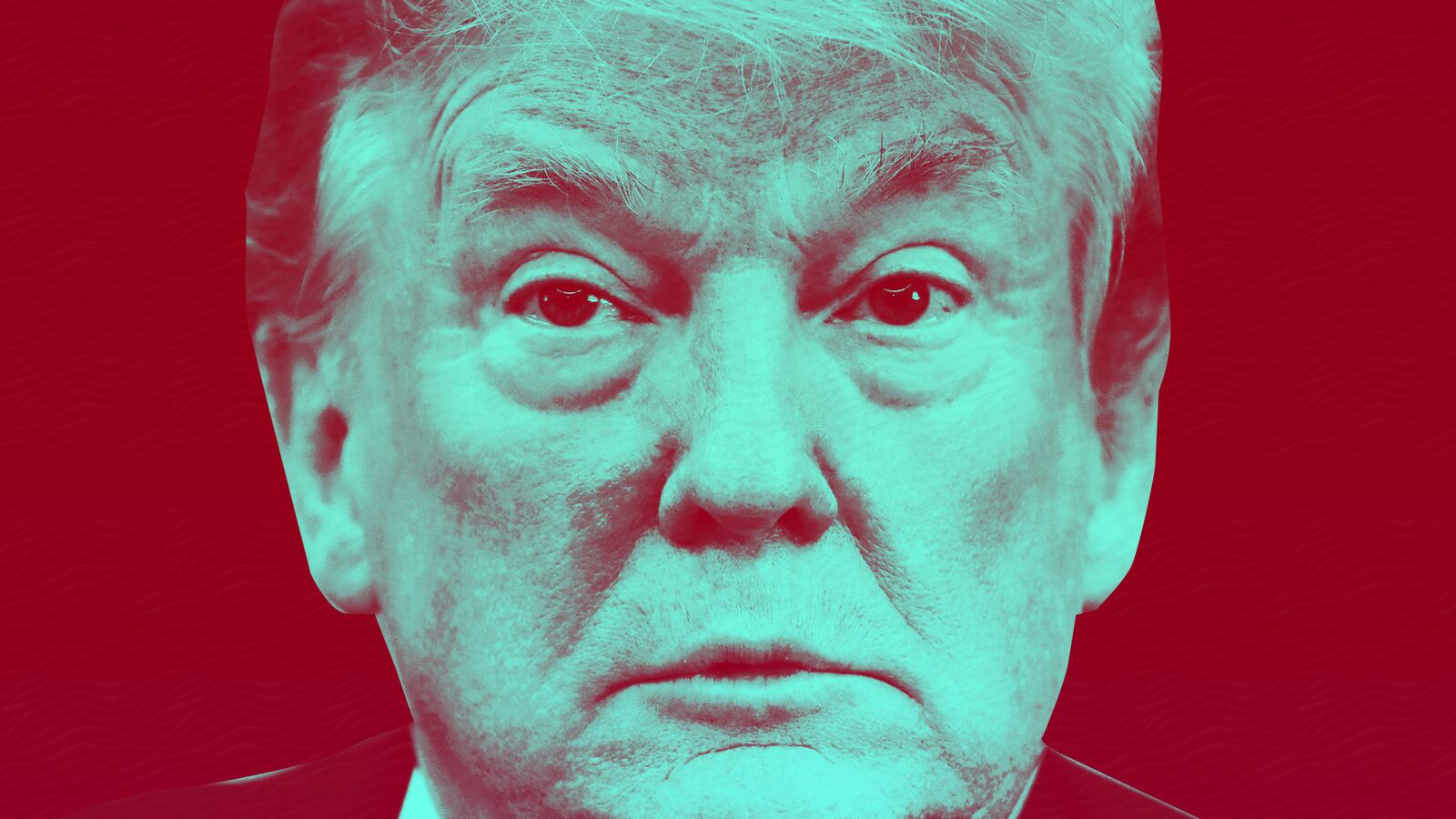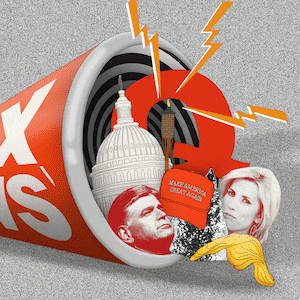After letting its hosts make wildly false claims about how Donald Trump’s political opponents supposedly “stole” the election from him, Fox News is facing potentially catastrophic lawsuits seeking billions in damages from election systems companies Dominion and Smartmatic.
That’s why the former president’s personal propaganda network is now trying to raise the shield of legal protections for the press that Trump has spent years smashing.
"I'm gonna open up the libel laws,” he said in 2016, so that “when they write hit pieces, we can sue them, and they can lose money." Once elected, he whined that, “Our current libel laws are a sham and a disgrace and do not represent American values or American fairness.”
But the First Amendment limitations on defamation liability that Trump and other right-wingers have long railed against well could be the only thing standing in the way of Fox News facing as much as $2.7 billion in damages in suits brought by voting technology companies that Trump and his favorite Fox hosts falsely accused of fraud in the wake of the November election.
The network’s chief lawyer, Viet Dinh—who reportedly “runs the company day-to-day” and serves as a “kind of regent” for Rupert Murdoch’s most valuable media property—has publicly shrugged off the suits, declaring that the “First Amendment” will “protect” the broadcaster from liability.
Dinh’s assertion that Fox will get off scot-free is based on a series of Supreme Court cases, beginning with the 1964 decision in New York Times v. Sullivan, that impose stringent limitations on the ability of certain plaintiffs, particularly those deemed to be “public figures,” to bring defamation lawsuits.
The Supreme Court’s defamation precedents are grounded on a recognition that the public interest is best served by allowing a wide berth for discussion about individuals, and matters of public concern—and that permitting public figures and officials to recover damages for unknowing and unintentional falsehoods would place an intolerable chill upon public discourse, and particularly upon journalism.
The facts of the Sullivan case are emblematic of the rationale for imposing constitutional limits on defamation liability. The case arose from a lawsuit brought against the New York Times for carrying an advertisement critical of misconduct by segregationist local officials in Alabama. After an Alabama jury assessed $500,000 in damages against the paper, a unanimous Supreme Court, in a decision by Justice William J. Brennan, Jr., ruled in the Times’ favor, announcing that a public official suing in defamation must not only prove that the challenged statement was false, but must also demonstrate that the defendant acted with “actual malice”—meaning with actual knowledge that the statement was false, or acted with reckless disregard as to its truth.
During the ensuing decades, the constitutional protections afforded by Sullivan and later related rulings have proven critical to permitting journalists, particularly those not affiliated with large media companies, with the ability to report upon—as well as citizens’ ability to criticize—prominent individuals, companies and government officials, without fear that unintentional errors could subject them to potentially catastrophic liability.
Some public figures have, however, chafed at their limited abilities to chill public discussion and criticism with in terrorem threats of defamation liability. One of the loudest complainers is Donald Trump, who entered the presidency promising to “open up” defamation law. As his presidency proceeded, and his antagonism to all forms of non-fawning press coverage become more pronounced, Trump’s focus on constraining and punishing unwelcome speech became even more all-consuming for Trump. Predictably, many on the right joined Trump in attacking the Supreme Court’s Sullivan rule, as well as the statutory protection against defamation liability afforded to internet enterprises that republish the words of others under Section 230 of the Digital Millennium Copyright Act, arguing that such protections unfairly benefited only the right’s ideological adversaries.
Trump’s railing against constitutional limitations on defamation law was always, however, more than a bit ironic, given Trump’s own absurdly frequent utterances of potentially defamatory falsehoods. Furthermore, when Trump was sued for defamation—including by alleged victims of his own past sexual assaults and harassment—Trump’s own lawyers did not hesitate to invoke every even remotely colorable argument for avoiding liability, including by asserting that Trump’s alleged falsehoods were protected by the First Amendment. Yet Trump, of course, has never been one to be concerned with either hypocrisy or inconsistency.
But such hypocrisy is becoming all the more untenable in a network that comprises the very center of right-wing media.
Fox News’ “regent” Dinh is a major star in the right-wing legal firmament, who after clerking on the Supreme Court went on to serve as the chief architect of the Patriot Act in the George W Bush Justice Department. After stints in academia and private practice, he joined Fox as chief legal and policy officer in 2018. Dinh’s first major step on the vocational ladder toward his current position of prominence was his service as a law clerk, to D.C. Circuit Judge Laurence Silberman, a Reagan appointee who is sometimes described as the Federalist Society’s favorite judge.
Silberman is always a good weathervane of prevailing right-wing legal views, and most recently he has been on a Trump-like rampage against the constitutional limitations on defamation liability.
Last month, Silberman penned a dissenting opinion on the topic that read much like a Fox News segment. Silberman derided Sullivan as a “policy-driven decision masquerading as constitutional law”; he claimed that the precedent was part and parcel of an “ever-expanding sphere of influence for the Judiciary at the expense of the policymaking branches” of government. But Silberman’s real grievance was not with the Supreme Court’s legal reasoning, but rather with the latitude the court has purportedly afforded to the “’liberal media”, which he claimed dominates the airwaves and newspaper pages. The judge contended that the “New York Times and The Washington Post, are virtually Democratic Party broadsheets.” He also asserted that “Democratic” dominance of the press and airwaves is so complete that it might amount to the first step toward a “potential authoritarian or dictatorial regime.
Silberman went on to contend that, given the grave danger the free press allegedly poses to democracy, it is time to strip journalists of the protections they have long enjoyed against defamation suits by public figures and officials. Silberman’s opinion, predictably, received fawning coverage from Fox, which highlighted the judge’s claim that “it is a profound mistake to stand by unjustified legal rules that serve only to enhance the press’ power.”
Silberman’s right-wing clarion call to the right to rise up in favor of voiding First Amendment protections against defamation liability in the name of preserving democracy and defeating the supposed hegemony of the Democratic Party comes at a peculiar moment, however.
During the months and weeks following the November election, the coverage of Fox News and other right-wing media outlets was crammed full of elaborate claims of voter fraud, including an elaborate conspiracy theory hatched by certain of Trump’s lawyers positing that two private voting technology companies, Dominion and Smartmatic, had fabricated votes and otherwise manipulated the outcome of the election in Biden’s favor.
As soon became clear, these claims were mendacious, and not based in even a modicum of fact. Dominion and Smartmatic have since brought defamation lawsuits against a range of Trump-related individuals, such as Rudy Giuliani, as well as several media outlets, including Fox. Given that Fox faces the very real possibility of catastrophic damages liability in these suits, one can hardly blame Fox lawyer Dinh for putting to one side the legal (and ideological) objections that Judge Silberman and other right-wingers have to the Sullivan rule, and—like Trump—instead make use of any potential constitutional (or other) defense available in an effort to avoid potentially catastrophic liability.
Dinh’s purported confidence that the Supreme Court’s defamation precedents will leave Fox in the clear may, however, be misplaced. The First Amendment does not categorically shield all defendants who make false and defamatory statements about public figures from liability. Rather, as explained, once there is a showing that the defendant was on notice that its statements were false, a public figure may well be able to recover substantial damages in a defamation case.
And the public record already provides ample evidence that Trump and his allies, including a number of Fox News hosts, such as co-defendants Jeanine Pirro, Maria Bartiromo, and Lou Dobbs, had ample notice that the wacky conspiracy theories they repeated on air about Dominion and Smartmatic were virtually entirely fictional. Accordingly, Fox’s resort to First Amendment defenses may well prove unavailing.
Furthermore, these commonsense boundaries on the scope of constitutional protections against defamation liability put to lie many of the assertions that right-wing critics like Trump and Silberman have made against the Supreme Court’s First Amendment precedents. The contention that the Supreme Court has erected First Amendment protections that allow journalists to lie without risk of facing legal consequences is itself simply false.
Rather, in enforcing the First Amendment’s protection of free expression, the Supreme Court has carefully balanced the need to protect journalists from facing catastrophic liability for unintentional misstatements while still allowing public officials and figures to recover damages when they are the victims of knowingly false statements that injure their reputations. Put otherwise, maybe Justice Brennan was right in defining the proper role for the Constitution in protecting the rights of journalists and citizens to report about (and criticize) the prominent and powerful, and the right-wing attacks on the Sullivan rule are wrong.


